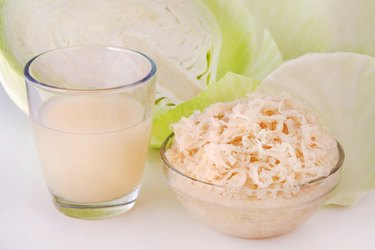
Sauerkraut juice, kraut juice or sauerkrautsaft (as it's called in German) refers to the liquid used to cure sauerkraut. Some people drink the juice, which is made up of pickling brine and juices from the cabbage, for the health benefits it's said to offer.
Fermented foods like sauerkraut have long been associated with health benefits, but as far as drinking sauerkraut juice goes, there are a few drawbacks you might want to consider. Here's what you need to know.
Video of the Day
Video of the Day
Tip
Most commercially available sauerkraut juice is high in sodium, which may not be ideal for people who are at a higher risk for heart disease.
Try using leftover sauerkraut juice in recipes like soups and salad dressings to reap the health benefits.
What Is Sauerkraut Juice?
Sauerkraut and its juices are made from naturally fermented cabbage. In this ancient method of food preservation, salted water or dry salt is added to shredded cabbage, which causes the cabbage to release juice containing lactic acid, flavoring and preserving the cabbage.
The juice can be used from freshly made sauerkraut, and it's also packaged and sold as an ingredient by itself.
Benefits of Sauerkraut Juice
Although they can be high in sodium, both sauerkraut and sauerkraut juice are linked to health benefits because they are considered fermented foods. Commercially made sauerkraut and its juice are also available in low-sodium varieties.
It Offers Probiotics
The fermentation process makes sauerkraut juice rich in natural lactic acid bacteria, or probiotics. Lactic acid probiotic bacteria has been tied to several nutritional benefits, like improved gut and overall health, per a June 2020 review in Nutrients.
For this reason, many people drink sauerkraut juice believing that it can help promote gut health and relieve digestive issues like constipation.
That said, there hasn't been too much research on the actual benefits of sauerkraut juice for your gut or any other aspect of health. More studies are needed to see how drinking sauerkraut juice affects the gut and overall health.
It's High in Vitamin C
Vitamin C is a powerful antioxidant that plays an important role in the health of your skin, bones and connective tissue. It helps your tissues heal and also helps you absorb iron.
Many fruits and vegetables are high in vitamin C. Sauerkraut and it's juice are particularly high in the vitamin — an 8-ounce serving of sauerkraut juice has 40 percent of the recommended daily value (DV), according to the USDA.
In the same serving, you'll also get 8 percent of your DV for calcium and iron, per the USDA.
Downsides of Sauerkraut Juice
If you're going to drink sauerkraut juice for health benefits, there are a few things to consider first.
Sodium
Sauerkraut and sauerkraut juice are typically preserved with salt, which means they're often high in sodium.
An 8-ounce serving of sauerkraut juice can have as much as 2083 milligrams of sodium, which is 88 percent of the DV recommended by the USDA.
Taking in too much sodium may increase your risk for heart disease, according to the American Heart Association (AHA). If you're already at high risk or are living with heart disease, you may want to limit sodium in your diet to 1,500 milligrams per day, per the AHA.
Stomach Upset
Because of the high concentration of probiotic bacteria in sauerkraut juice, it's possible you could experience digestive symptoms when you drink it.
People have reported diarrhea and stomach pain as side effects of drinking sauerkraut juice. Stop drinking sauerkraut juice if you experience these symptoms, and contact your doctor if they persist.
Other Ways to Use Sauerkraut Juice
If you've used all the sauerkraut and want another use for the extra sauerkraut juice, drinking it may not be the best idea, but there are a few other ways to use it so you're still getting those beneficial probiotics:
- Use sauerkraut juice to marinate meats.
- Create a base for homemade salad dressing.
- Use it as a brine for other veggies, like cucumbers.
- Stir it into a soup recipe.